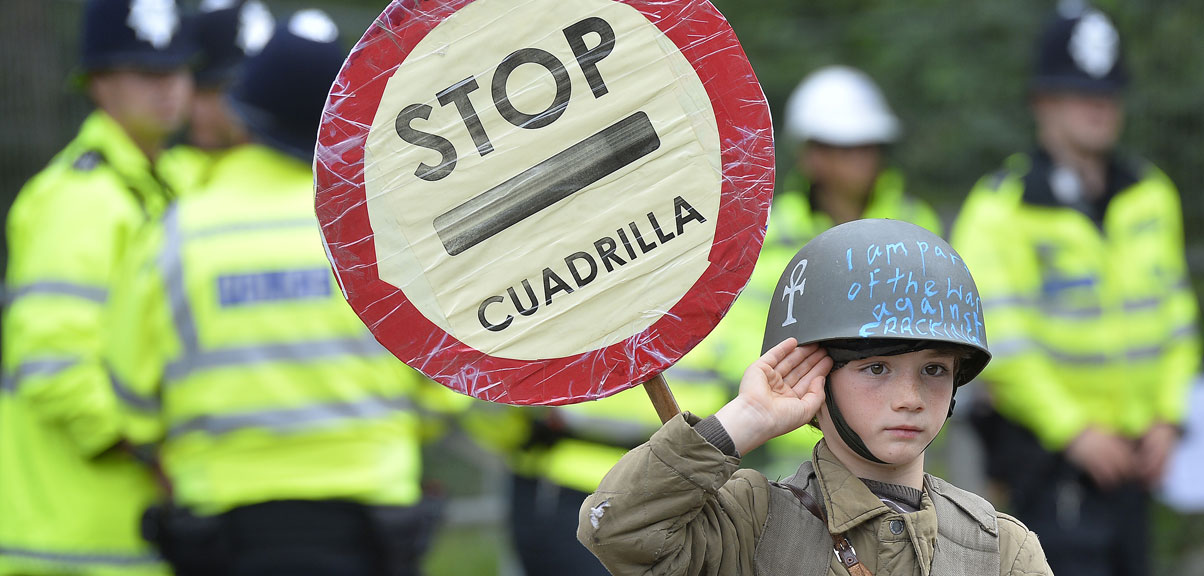What could fracking for shale gas mean for you?
As the debate surrounding environmental issues over fracking grows, Channel 4 News asks what would happen if shale gas was found in your back yard?

Drilling company Cuadrilla Resources was granted a licence in July to drill an exploratory well in Balcombe, West Sussex for oil and gas on the site.
Britain is thought to have major shale reserves which could help reverse a rising dependency on energy imports, but the industry is having to tread carefully in order to reassure a sceptical public and vocal environmental lobby.
The well is a conventional one that will not use fracking, but Cuadrilla has fracked elsewhere, and is one of a handful of companies with access to shale acreage that might be fracked in future, and so its activities have become a target for anti-fracking protests.
The CEO of the drilling company Cuadrilla, Francis Egan, told anti-fracking protesters on Wednesday that his company “is doing nothing wrong” by drilling in Balcombe.
“We have been through the planning process [through West Sussex County Council],” he said.
“We are a company, we follow the rules. We have the approval to go ahead and to work within our existing planning consent”.
Petroleum Act
Even if shale gas is found in Balcombe, any fracking procedure would require another licence from the Department of Energy and Climate Change.
The Planning Authority then deals with applications for planning permission for the site.
The Health and Safety Executive regulates the process safety aspects of this work, in particular, HSE will consider well integrity and construction.
The Petroleum Act 1998 allows for compulsory purchase of land in order to drill for oil and gas raising fears that residential areas could be affected.
The Department of Energy and Climate Change however insist “operators will always locate in open ground to reduce costs.”
A DECC spokesman said: “No such compulsory purchase order has ever been implemented and there is no risk in practice of anyone’s home being subject to compulsory purchase to make way for a shale gas or any other kind of oil and gas project.
“Unlike other minerals excavated from the surface, there is considerable flexibility about exactly where to locate a drilling rig to access any oil or gas resources below.”
The DECC said operators can “in principle seek the rights they need to access a mineral (including oil or gas) by a court order”.
The spokesman added: “If a court order were made, the court would determine the appropriate compensation, applying the valuation principles established in cases of compulsory purchase”.
John Bosworth, partner at Ashfords Solicitors, however said that licence owners might not have to pay compensation to homeowners.
He said: “If you want to extract the gas from someone’s private land, if you have a licence to do so under the Petroleum Act 1998, you don’t need to pay them compensation as the gas belongs to the Crown.”
Licence holders however might “need rights to access other areas where there is no gas (to build roads, depots or oil drilling rigs etc connected with the extraction)”.
Mr Bosworth added: “[In this case] they need to go through the Secretary of State for Energy and Climate Change. The Minister then needs to refer the request to the High Court.
“Compensation in this case will be based on the impact of the loss of the land to the land owner, not on the benefit to the licence holder. As a result the level of compensation will be fairly small compared to the value of the gas.”
-
Latest news
-
India’s ‘YouTube election’: Influencers enlisted to mobilise youth vote6m

-
Putin denies plans to capture Ukrainian city of Kharkiv3m

-
Plaid Cymru ends co-operation agreement with Welsh Labour government4m

-
Infected blood scandal: Government was warned years before taking action6m

-
Displaced in Gaza have to ‘start from Zero’ many times over, says Gaza NGO director3m

-




